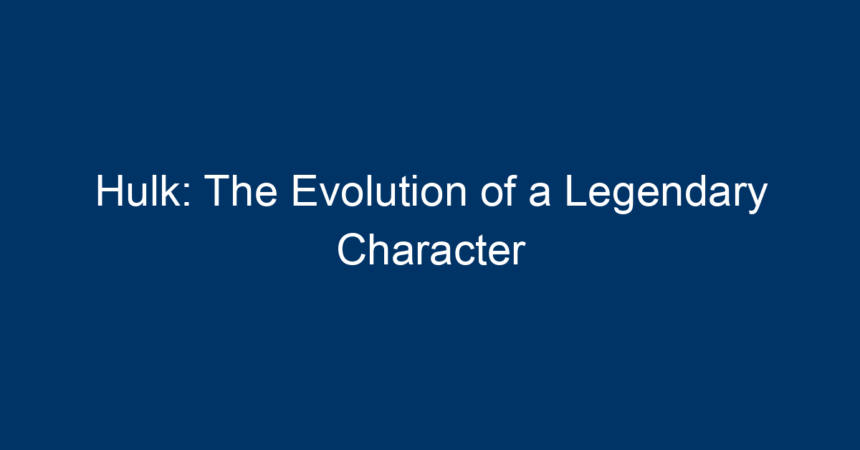The Hulk, one of the most iconic superheroes in comic book history, is a character that has undergone immense evolution since his debut in 1962. Created by writer Stan Lee and artist Jack Kirby, Hulk’s journey has traversed vast landscapes, from comic books to blockbuster movies, and even to animated series. But what makes the Hulk so legendary? In this article, we will explore the character’s origins, development, and cultural impact, illuminating how the Hulk continues to resonate with fans of all ages.
Origins of the Hulk
The Hulk made his first appearance in The Incredible Hulk #1, a comic that introduced readers to Dr. Bruce Banner, a brilliant scientist who transforms into a gigantic, green creature after a gamma radiation accident. This origin story taps into universal themes of fear, anger, and the struggle between intellect and raw power.
The First Comics
In the early comics, Hulk was portrayed as a misunderstood monster, often hunted by the military and society at large. This narrative provided a rich landscape for exploring themes of alienation and duality. The Hulk’s first stories grapple with the conflict between his human side, Bruce Banner, and his monstrous counterpart, showcasing the psychological depth of the character.
The Hulk in 1970s Media
As the Hulk’s popularity grew, the character transitioned into other mediums. The 1970s television series The Incredible Hulk, starring Bill Bixby as Banner and Lou Ferrigno as the Hulk, introduced the character to a broader audience. The show focused on the human side of the Hulk, emphasizing Bruce Banner’s struggle to control his alter ego and seeking a cure for his condition.
Impact of the TV Series
The TV series carved a place for the Hulk in American pop culture, underscoring themes of isolation and the quest for acceptance. The famous catchphrase, "Don’t make me angry. You wouldn’t like me when I’m angry," epitomized the character’s identity and resonated with audiences.
The Transition into Comic Books: The 1980s and 1990s
The comic series evolved significantly in the 1980s and 1990s, exploring darker and more complex themes. Writers like Peter David introduced new narratives that further developed the character’s psychology and emotional depth.
The Introduced Variations
During this time, the Hulk’s character expanded to include different personas, such as the intelligent, cunning "Gray Hulk" and the savage "World War Hulk." These variations showcased the internal conflicts within Bruce Banner and depicted how his personality could shift, reflecting his mental state.
The Modern Era of Hulk: 2000s and Beyond
As comic books entered the 21st century, the Hulk underwent yet another transformation. Marvel’s cinematic universe (MCU) redefined the character, drastically changing how he was perceived by audiences worldwide.
The Cinematic Debut
The Hulk made his modern cinematic debut in Hulk (2003), directed by Ang Lee. Although the film received mixed reviews, it set the stage for future portrayals. The real breakthrough came with The Avengers (2012), where Mark Ruffalo took on the role of Bruce Banner. This portrayal brought a blend of humor, vulnerability, and intellect, making the character more relatable and beloved than ever.
The Hulk’s Cultural Impact
The Hulk is not merely a comic book character; he has become a symbol of inner struggle and conflict. His narrative resonates with various societal issues, including mental health awareness, the duality of human nature, and the fight for acceptance.
The Symbolism Behind the Hulk
The character embodies the battle between our darker impulses and the societal norms we strive to uphold. In today’s world, where mental health issues are increasingly recognized, the Hulk can be seen as a manifestation of anger and frustration, illuminating the need for compassion and understanding.
Merchandise and Beyond
From toys to video games, the Hulk’s image permeates popular culture. His catchphrases and iconic look inspire merchandise that reaches audiences of all ages. The character has also appeared in several animated series, maintaining his relevance in contemporary media.
The Future of the Hulk
The Hulk’s story is far from over. With ongoing comic series and future Marvel cinematic projects anticipated, fans are eager to see how the character will evolve in the years to come.
Speculations About Future Appearances
There are discussions about the potential for a standalone Hulk film and how the character will interact with new characters in the MCU. The introduction of alternative timelines and multiverse concepts opens the door for exciting possibilities.
Conclusion: Embracing the Hulk Within Us
The evolution of the Hulk is a fascinating journey that highlights the complexities of human emotion and identity. From his origins in comic books to becoming a major cinematic icon, the Hulk remains a character that resonates with audiences worldwide.
Actionable Insights for Fans
-
Engage with the Comics: Dive into the various series from different eras to appreciate the character’s development.
-
Explore the Movies: Watch the range of films featuring the Hulk to understand how different directors interpret the character.
-
Participate in Discussions: Join online forums or social media groups dedicated to Hulk to connect with fellow fans and share insights.
- Follow Upcoming Projects: Stay informed about upcoming movies and comic releases featuring the Hulk to remain part of his evolving story.
By embracing the complexity of Bruce Banner and the Hulk, we not only celebrate a legendary character but also reflect on our own struggles and the strength needed to face them. In a world that often feels chaotic, the Hulk reminds us that it’s okay to feel anger, but what truly matters is how we channel that energy into something positive.




